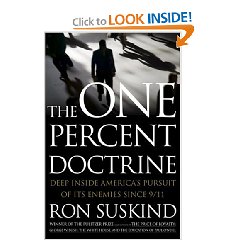
Impeaches Cheney, Demeans Bush, Crucifies Rumsfeld and Rice,
1) Vice President Cheney is impeachable for dereliction of duty and obstruction of due process in government as well as many violations of international and domestic law. While I do not see the President as quite the puppet some represent him to be, he is certainly childish and petulant and angry at his father (page 107: “I'm not going to be supportive of my father and all his Arab buddies.”) Cheney and his neo-cons nurtured the young President's inclination to “unleash” Israel against the Palestinians, and Cheney is specifically impeachable for not providing the President with a copy of the Saudi Arabian memorandum of grievances that preceded a summit at the ranch which was of MAJOR importance to the entire Middle East situation. The author excels at showing how Dick Cheney has “experimented”, from President Ford onward, with specifically NOT briefing the President, ostensibly to give him plausible denial but in this instance, more as a means of Cheney's deposing Bush as the actual head of State.
2) I cannot take the second step of suggesting that Bush himself is impeachable on the basis of this book. What I see–and the author excels at social-psychological insights across the entire text–is an insecure young man with excessive faith in his gut instinct, loosely-educated, hostile about experts and especially mature experts like Brent Scowcroft, and all too eager to prove his (inadequate) manliness by being belligerent and often a bully. “Bring it on.” The author of this book combines analytic insights into the character of the President, with detailed discussion of the degree to which the White House completely ignored the policy process to “do what they want, when they want to, for whatever reason they decide.” On the basis of this book, one can conclude that Cheney should be impeached and Bush still needs a good spanking from his father. In this context, the author provides a memorable quote on page 227, “America, unbound, was duly led by a President, unbound” and also “free from conventional sources of accountability.”
3) The third major focus of this book is the combination of incapacity of the CIA and the FBI and the Pentagon in evolving to deal with the post-9/11 challenges. The FBI comes off as the most inept, consistently unable to do its job on the home front. Rumsfeld is next in line for condemnation, and while the author is very professional in his review, he quotes Rumsfeld as saying that “every CIA success is a DoD failure,” and he quotes then Vice President Nelson Rockefeller as considering Rumsfeld to be “beneath contempt.” One can only be stunned as the six years going on eight of having a government that is BOTH “out of control” AND inept. The CIA, and George Tenet, are featured as the least incompetent among the three. At a minimum, they did find and track Bin Laden over a week as he fled Afghanistan and the Pentagon refused to put US troops into Afghanistan's border region; and they did get other aspects right in relation to the policy debate that was not allowed to happen. The title of the book refers to the Vice President's decision that even a 1% probability of what he chose to emphasize, was sufficient to eliminate the policy process and all standards of evidence, sufficient to close out all reasoned debate.
There are a number of gems in this book that merit note:
1) Cheney was responsible for both intelligence and terrorism from day one of the Bush Administration, and was clearly derelict in his duty in ignoring both.
2) The book clearly lays out how the Administration's obsession with Iraq sidelined all CIA warnings including the 6 August warning and others. Bush is quoted in the book as having dismissed the last CIA briefing team, which made a frantic attempt to alarm him, as “OK, you've covered your ass now.” Boy kings as “enfant's terribles!”
3) The book captures in detail the incompetence of the CIA and FBI as a general rule. On one page, the author quotes the Vice President as chewing out both agencies, saying “You don't cooperate for shit.” On another page, he quotes George Tenet as telling the assembled Allied intelligence chiefs, “We don't know shit.”
4) The author provides a superb review of successes in one area, following the money, but ends on a down note because now Al Qaeda and everyone connected to the financial support of Al Qaeda has gone “offline” to use couriers and cash. As the author says, we are now, again, deaf and blind. In passing the book puts Western Union out of business in the Arab world, at least among those desiring to do illegal transactions. In this context the author makes it clear that First Data volunteered to help, and confirms that the Bush Administration decided with great deliberation to ignore the FISA court and its *exclusive* mandate from Congress.
Other tid-bits:
1) CIA had the mastermind of the London bus bombings in its sights, but put him on a no fly list rather than help the UK track him.
2) Al Qaeda chose NOT to go after nuclear targets with the 9/11 bombings, “for fear it would go out of control.” This suggests a reasoned enemy.
3) Brent Scowcroft produced a plan for intelligence reorganization that was sensible, and that was blocked by Cheney, who also blocked the 1992 intelligence reform effort.
4) Condi Rice is crucified in this book for a broken NSC process and lack of gravitas.
Book ends with Deuteronomy 16:20, justice twice, once for ends, one for means. This book fails the Bush Administration on both counts.
See also:
Vice: Dick Cheney and the Hijacking of the American Presidency
Crossing the Rubicon: The Decline of the American Empire at the End of the Age of Oil
9/11 Synthetic Terror: Made in USA, Fourth Edition
Bush's Brain








